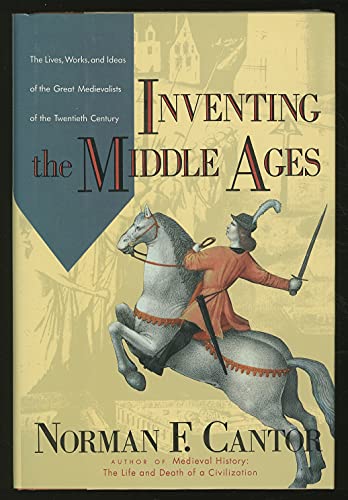INVENTING THE MIDDLE AGES: The Lives, Works, and Ideas of the Great Medievalists of the Twentieth Century
In this ground-breaking work, Norman Cantor explains how our current notion of the Middle Ages-with its vivid images of wars, tournaments, plagues, saints and kings, knights and ladies-was born in the twentieth century. The medieval world was not simply excavated through systematic research. It had to be conceptually created: It had to be invented, and this is the story of that invention.
Norman Cantor focuses on the lives and works of twenty of the great medievalists of this century, demonstrating how the events of their lives, and their spiritual and emotional outlooks, influenced their interpretations of the Middle Ages. Cantor makes their scholarship an intensely personal and passionate exercise, full of color and controversy, displaying the strong personalities and creative minds that brought new insights about the past.
A revolution in academic method, this book is a breakthrough to a new way of teaching the humanities and historiography, to be enjoyed by student and general public alike. It takes an immense body of learning and transmits it so that readers come away fully informed of the essentials of the subject, perceiving the interconnection of medieval civilization with the culture of the twentieth century and having had a good time while doing it! This is a riveting, entertaining, humorous, and learned read, compulsory for anyone concerned about the past and future of Western civilization.
To 19th-century romantics, the Middle Ages were a justification for aesthetic passion and communal feeling. In contrast, the 20th century's picture of the Middle Ages stresses its synthesis of faith and reason, charismatic leadership of saints and heroes, formalist attitude to art and literature, and ideas of divine and human love. These constructs, argues New York University medievalist Cantor, are the product of such influential medievalists as Frederic Maitland, Erwin Panofsky, C. S. Lewis and Richard Southern. His sometimes provocative study combines intimate profiles of 20 medievalists with an assessment of the impact of their ideas on our image of the Middle Ages. Cantor unravels the "common man's ethos" in J.R.R. Tolkien's Lord of the Rings and discusses Eileen Power's searing indictment of the Middle Ages' marginalization of women. He invents his own Middle Ages: one that tells us to reject the "regulatory and welfare state" and reassert the values of civil society and "tough love."
Copyright 1991 Reed Business Information, Inc.
This book is much broader in scope than the title would imply. Part historiography, part biographical sketches, and part personal memoir, it explores the lives of the 20 scholars (19 men and one woman) whom Cantor perceives as "the great medievalists" of the period 1895-1965. His thesis is that Wilsonian idealism, World War II, the Nazi Holocaust, and the Cold War shaped the world views and the interpretations of the European and American scholars studying the Middle Ages. The book is based on Cantor's frequently brilliant, sometimes fanciful (he knew seven personally) analysis of the scholars' works; their obituary notices; and his memory of conversations that took place 40 or more years ago. Strong on the historians (predictably, since Cantor is a historian), respectable on the literary scholars, weak on the art historians, the book contains a mine of information, much of it anecdotal, about those discussed. Bristling with prejudices, judgments (in many cases wrongheaded), and predictions, clever and witty in style, it will command a wide audience in both academia and the informed reading public. For research and general collections. History Book Club selection. -- Bennett D. Hill, George town Univ., Washington, D.C.
Copyright 1991 Reed Business Information, Inc.
